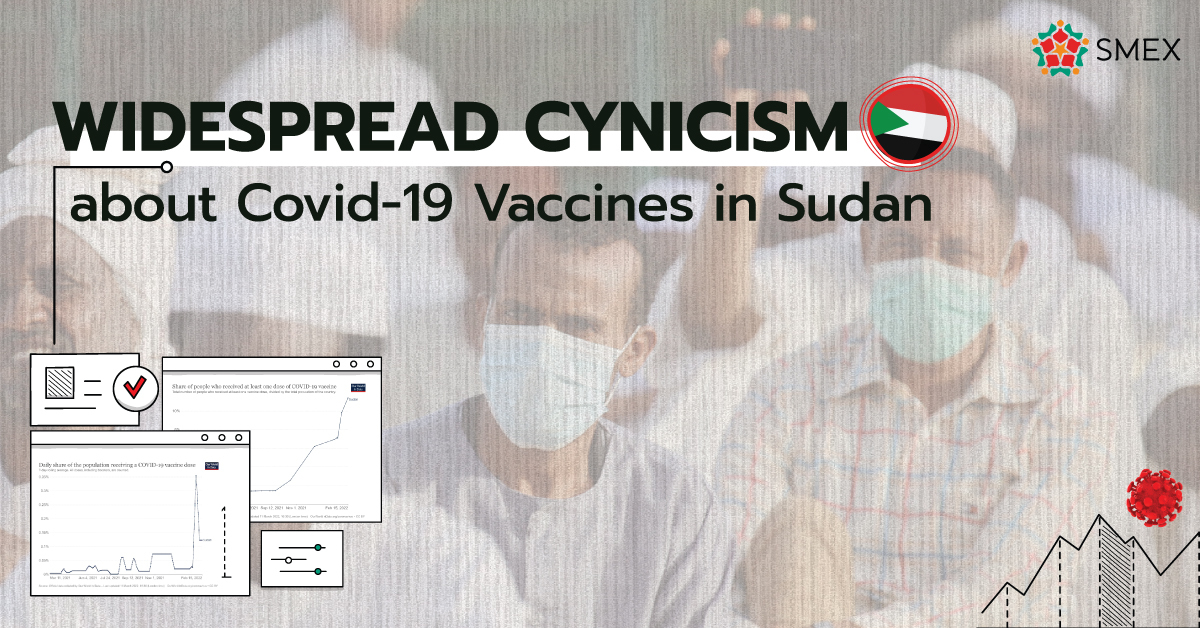After the Covid-19 pandemic, the discovery of new viruses became a topic that immediately made the headlines. Even before any concrete cases are reported, many rush to share what they’ve heard, even if the information is wrong or used out of context, as in the case of the most recent Monkeypox virus. Nevertheless, our collective experience with Covid-19 misinformation can arm us in the face of new myths and conspiracies around new and old diseases. How has Sudan dealt with fake news about Covid over the past two years?
Covid-19 rumors and misconceptions have deterred a considerable portion of the Sudanese population from getting vaccinated. The government has failed to adequately address the country’s “fake news” pandemic. Alternatively, community initiatives by Non-Governmental Organizations and private media companies were more effective in countering the surge of misguided facts and conspiracy theories around the Covid-19 vaccine.
Vaccine Skepticism
Most of the Sudanese population is still unvaccinated against Covid-19. According to the data visual provided by “Our World in Data,” the percentage of people who have received multiple vaccine doses is still less than 10% in 2022. Vaccines that are currently being administered in Sudan include: AstraZeneca, and Covax. Many remain skeptical about the effectiveness and necessity of Covid-19 vaccination. By contrast, traditional medicine, such as Garad, tends to have greater credibility as the antidote to the disease.
According to the Internews bulletins on COVID-19, rumors within Sudan claim that vaccines may alter the human DNA or cause high temperatures that nullify the vaccine’s efficacy. Other rumors circulated claiming that the Johnson and Johnson vaccines are fatal, and that they affect menstrual cycles and pregnancy in female patients.
In addition to such misconceptions, leaders in Sudan are abusing their professional and societal influence to propagate misinformation about COVID-19 vaccines, in service of their own agendas. As a result, only less than 15% of the Sudanese population have received their COVID-19 vaccines so far.
Government Response to Covid-19 Misinformation
The Sudanese transitional government inherited a fragile healthcare system with scarce funds, which explains its weak response to the Covid outbreak. The pandemic severely compromised the health sector’s already tenuous facilities and capabilities. As a result, the government launched some small-scale initiatives that would fight off Covid-19 vaccine misinformation, but only to a limited degree.
One example is the semi-daily media program by the Ministry of Health and the Ministry of Information. This program provided updates on the status of Covid-19 in Sudan, covering live the numbers of infections, active cases, and fatalities. It also broadcasted Covid-19 precautions in the Arabic-Sudanese dialect, based on the tips provided by the World Health Organization (WHO), which made this information more widely accessible.
On the other hand, the Ministry of Health set up a free hotline number (221), accessible via phone calls and landlines, to provide people with verified information about Covid-19. The hotline operators were either medical professional personnel or trained volunteers. The Ministry of Health also provided isolation centers, recorded complaints on people who violated the curfew or ignored protection instructions, and documented the administration of vaccination doses.
Non-Governmental Initiatives
Due to the many challenges and obstacles that the transitional government is facing in Sudan, civil society, news outlets, and various social media accounts created alternative initiatives and projects to fight off misinformation related to Covid-19 and its vaccines.
Private media outlets like Andariya published many informative articles in both English and Arabic on their website and partnered with other organizations for this purpose. Launched by Internews in partnership with Andariya, Rooted in Trust is one such project that published weekly bulletins to address rumors about Covid-19 spreading on social media and in the public discourse offline. Andariya also partnered with the initiative The Pandemic SD to spread awareness about the pandemic on twitter.
Moreover, Five Hundred Words Magazine published articles on Covid-19, but in the English language only. Ayin Network, a Sudanese investigative journalism media outlet, published a number of articles and produced short documentaries in English and Arabic about Covid-19, misinformation about it, and its impact on civilians socially and economically.
Social media has been a key player in fighting off vaccine misinformation, where platforms like Meta collaborated with the World Health Organization to utilize their marketing and ads tools to fight Covid-19 misinformation around the globe. “In my opinion, the effectiveness of fighting misinformation about Covid-19 vaccines on social media can’t be accurately measured. So, unless more Covid-19 vaccines are administered, we can’t really evaluate the Covid-19 misinformation fight,” explained Awab Ali, a Sudanese Digital Marketing Executive.
As such, it’s very hard to use statistics or indicators to measure the impact of the procedures and campaigns for promoting Covid-19 vaccines that were organized by either the ministry of health, NGOs, or other initiatives.
Awab told SMEX that there were three main reasons for social media’s inefficiency in fighting misinformation about Covid-19 vaccines:
“(I) The number of people who use social media compared to the population is small, but its effect on non-social media users is huge,
(II) The form in which the misinformation is spreading on the social media is usually Memes or other forms of sarcasm,
(III) Until this day, social media ads are still unavailable in Sudan due to the sanctions. So, any social media ads campaign targeting misinformation related to Covid-19 vaccines has no effect in Sudan.”
The Sudanese government still has a long way to go before the end of misinformation about Covid-19 vaccines. There are multiple media outlets and NGOs that contributed vastly to the process, but their impact remained limited. In the digital world, social media platforms used their marketing and ads tools and software to curb COVID-19 vaccine misinformation, but have failed to apply the same procedures in Sudan.


